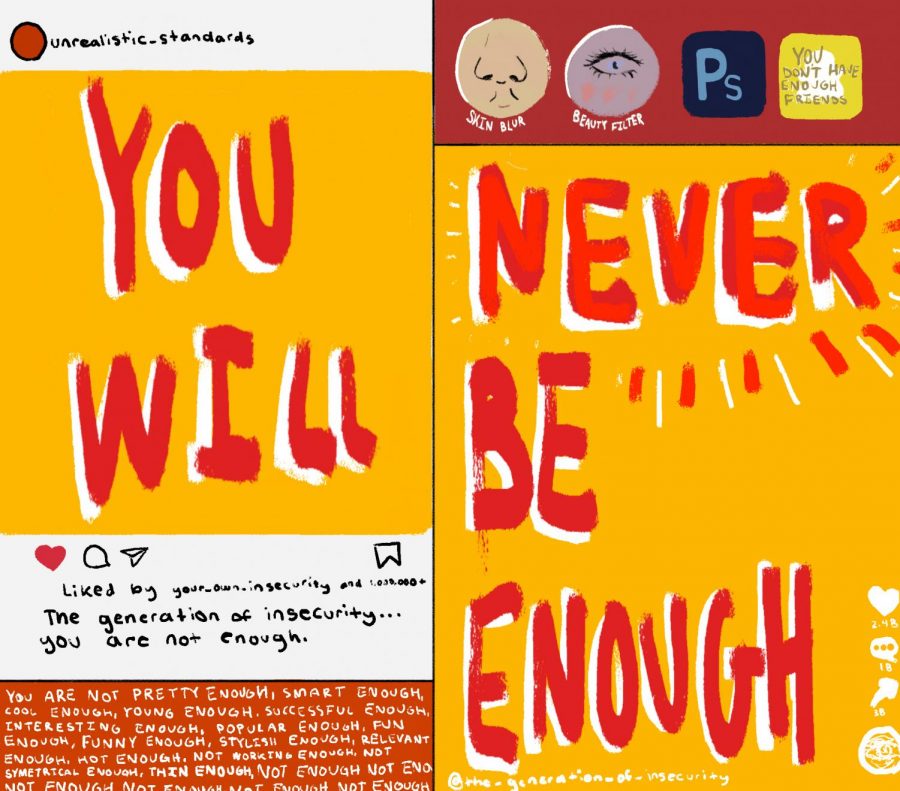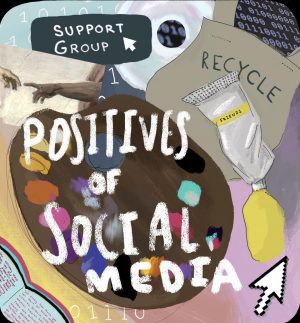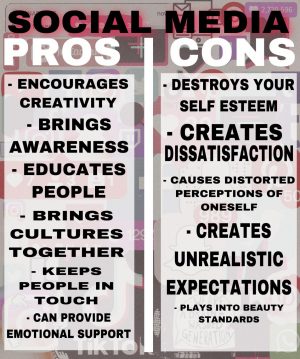You Will Never Be Enough: Anti-Social Media
We are the generation of insecurity, and social media is to blame.
September 3, 2021
At this point, everyone knows faces and bodies are often photoshopped on Instagram- the side by side of photos from real life and ones from Instagram have been floating around for years now. Everyone knows that videos are edited to leave out the ‘bad’ parts. Everyone knows viewers are easily manipulated through photos and videos, and most people know that the amount of likes they receive does not reflect their likability as a person or their talen. But the longer you’re on social media, the harder it is to remember these things, the harder it is to believe this, the harder it is to shake those negative voices that were implanted into your head.
Social media of all forms is a degrading and addictive part of over 3.96 billion people’s daily lives. In 2020, the average person owned 8.6 social media accounts. The average time spent on these accounts a day was 2 hours and 24 minutes
Instagram is a particularly corrosive app with many ways it actively harms people’s confidence and satisfaction with their reality, a cesspool of shame.
Instagram is filled with plastic surgery, photoshopped faces and bodies, people showing off their ‘amazing’ lives, advertisements pushing diet pills and new exercises for weight loss, and it clearly displays one single image of ‘beauty’. Skin is brushed to be freed of texture. Waists are cinched inwards with a computer mouse, just as thighs are expanded. Jaws are tweaked to be even on both sides. Cheekbones are accentuated by being pulled inward and shaded in a certain way. Noses are made to be smaller. According to a 2017 study conducted by Cognitive Research, people can only tell an image is manipulated 65% of the time… a percentage that has likely risen since due to the better applications meant to tweak them. Clearly, this is having an effect: as found by a 2020 study done by Eldamen Data & Intelligence, 80% of girls have utilized a filter or altered the way they look through apps by the time they are 13 years old.
On Instagram, you are taught that only a few features will deem you as beautiful, and an absence of any of them will make you ugly. As a result, from celebrities to normal people, everyone has started to look unnervingly similar. With society and consumers caught in a ruthless cycle, those who fit that one look garner far more attention than those who don’t. Thus, it is seemingly confirmed to everyone that one must look a certain way to have value, that your looks are more important than the depth or value of anything you have to say and the impact of anything you do- a certain way that most people don’t even naturally look like, and a way people go as far to risk their lives through plastic surgery to achieve.
On TikTok, the experience is similar to that of instagram. Every once in a while, a girl will come up on the ‘for you’ page wielding a new feature to be insecure about, a new trend made solely for the purpose of validation. TikTok is relentless with body validation and shame trends. First came the comparison of side profiles and a focus on petite noses, then came the reverse camera to highlight the lack of perfect symmetry of your face . Then came , and then the glow filter
Coming from an already insecure girl, before TikTok, I had never felt insecure about the symmetry of my face, I never noticed that my jaw is slightly uneven. Before TikTok, I never absolutely loathed my side profile, albeit I had some insecurities about it.
Glow filter. “If it looks fake on you, you’re just pretty. If it looks natural, you’re beautiful.” I know this statement is absolutely meaningless, I know it’s based off of nonexistent facts, I know this statement was completely pulled out of thin air. It was a stupid statement. But when my curiosity and insecurities got the best of me and I tried that filter, and no matter what lighting I was in it looked incredibly fake, that statement got to me. I felt insecure and shameful.
I downloaded TikTok for the art content. I mainly use it for the art content. But somehow, these little insecurities will slip into my for you page, and thus into my mind, and then plant ideas in my head that are hard to uproot. Snapchat, Instagram, and TikTok are all guilty of making users self conscious through their unrealistic and overproduced filters.
Social media also plays into social status and allows for quantifiable comparison, centering around the like feature and the comments left and followers and, on Snapchat, how many friends a person has and if their “best friend” doesn’t have them as their best friend back.
Well, that person has way more likes than me. Do people hate me? What does that person have that I don’t? Why have they received more comments about how pretty they are than I have? It convinces you to believe that worth is determined by popularity and adoration, when worth has absolutely nothing to with either. Every platform has a like feature to give users a quantifiable method of comparison- which makes the sources seem more valid- to others, and comments that nitpick your life and provide yet another easy method of comparison. And even though Instagram made it possible for users to remove likes, very few actually have. With users feeling safe behind their screens, the comments can be absolutely ruthless and resort to attacking a person’s looks because they didn’t like their opinion. TikTok is especially guilty of this.
Social media also provides viewers with a very tailored, very curated life, and thus, due to the ability to shape your life however you want it to look, gives an unrealistic and ‘perfect’ reality- a reality they themselves don’t even live up to in real life. Nonetheless, expectations are set, especially for younger audiences who are more impressionable. It’s easy to look at someone’s social media life and compare it to your own and feel as though you’re missing out or falling behind or envy what they have that you don’t. Social Media provides a quick way to compare your real relationships with couples at their best. It provides an easy way to compare your own body to someone else’s. This comparison is beyond harmful and oddly addicting, a never ending search for validation you will not receive. I know I have personally used social media to feed my own self hatred and consciousness.






